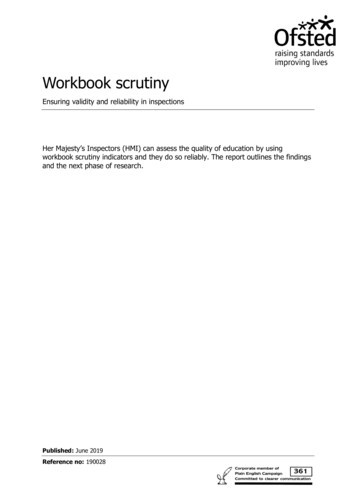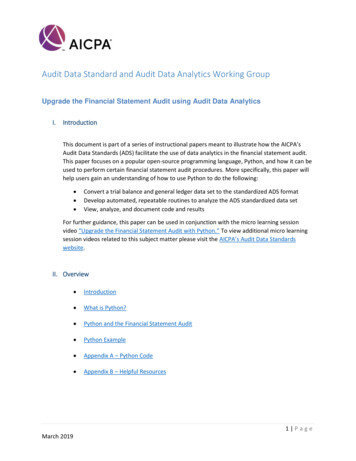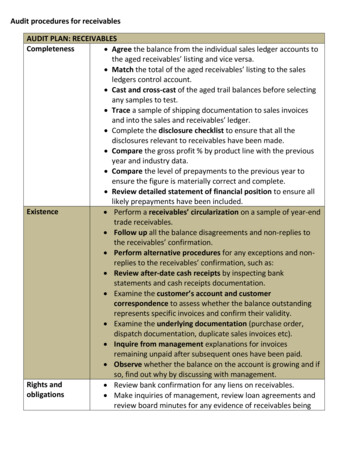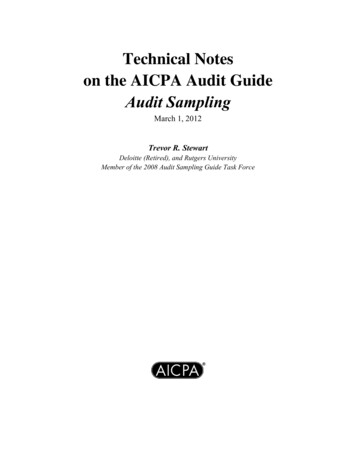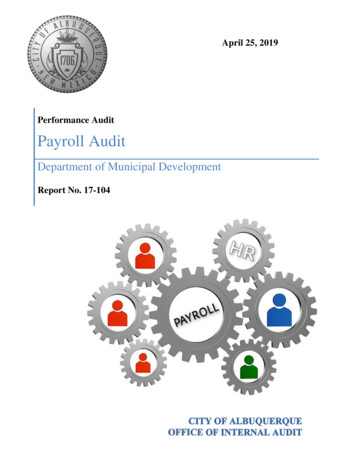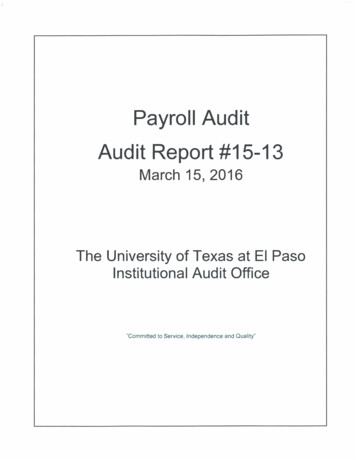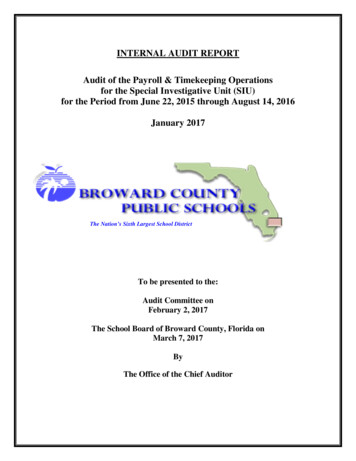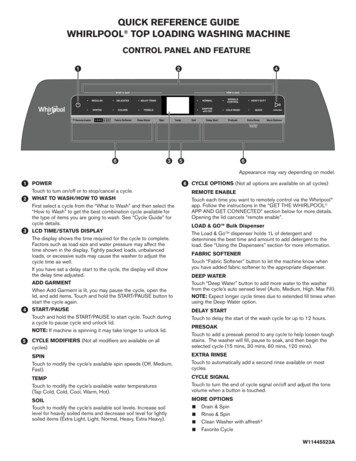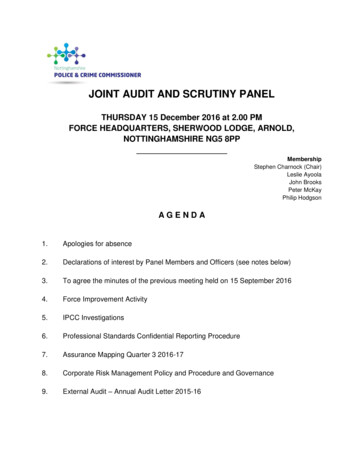
Transcription
JOINT AUDIT AND SCRUTINY PANELTHURSDAY 15 December 2016 at 2.00 PMFORCE HEADQUARTERS, SHERWOOD LODGE, ARNOLD,NOTTINGHAMSHIRE NG5 8PPMembershipStephen Charnock (Chair)Leslie AyoolaJohn BrooksPeter McKayPhilip HodgsonAGENDA1.Apologies for absence2.Declarations of interest by Panel Members and Officers (see notes below)3.To agree the minutes of the previous meeting held on 15 September 20164.Force Improvement Activity5.IPCC Investigations6.Professional Standards Confidential Reporting Procedure7.Assurance Mapping Quarter 3 2016-178.Corporate Risk Management Policy and Procedure and Governance9.External Audit – Annual Audit Letter 2015-16
10.Audit & Inspection Report Quarter 211.Internal Audit Progress Reports12.Work plan and meeting scheduleNOTES Members of the public are welcome to attend to observe this meeting For further information on this agenda, please contact the Office of the Policeand Crime Commissioner on 0115 9670999 extension 801 2005 or emailnopcc@nottinghamshire.pnn.police.uk A declaration of interest could involve a private or financial matter which could beseen as having an influence on the decision being taken, such as having a familymember who would be directly affected by the decision being taken, or beinginvolved with the organisation the decision relates to. Contact the DemocraticServices Officer: alison.fawley@nottscc.gov.uk for clarification or advice prior to themeeting.
NOTTINGHAMSHIRE POLICE AND CRIME COMMISSIONERCounty Hall, West Bridgford, Nottingham, NG2 7QPMINUTESOF THE MEETING OF THENOTTINGHAMSHIRE POLICE AND CRIME COMMISSIONERJOINT AUDIT & SCRUTINY PANELHELD ON THURSDAY 30 JUNE 2016FORCE HEADQUARTERS, SHERWOOD LODGE,ARNOLD, NOTTINGHAMSHIRE NG5 8PPCOMMENCING AT 2.00 PMMEMBERSHIP(A - denotes absent)AAMr Stephen Charnock (Chair)Mr Leslie AyoolaMr John BrooksDr Phil HodgsonMr Peter McKayOFFICERS PRESENTPaddy TippingCharlotte RadfordSue FishBrian WelchSimon LaceyJackie AlexanderNatalie BakerMark KimberleyPhil GilbertPaul DawkinsAlison Fawley1.Police and Crime CommissionerChief Finance Officer, OPCCT/Chief Constable, Notts. PoliceMazaarsKPMG (External Audit)Notts PoliceGovernance & Business Planning ManagerHead of Finance, Notts PoliceHead of Strategy & Assurance. OPCCACO, Finance (via video link)Democratic Services, Notts. County CouncilCHAIRRESOLVED 2016 / 014
That, in the absence of Stephen Charnock, John Brooks take the Chair for thismeeting.2)APOLOGIES FOR ABSENCEApologies for absence were received from Stephen Charnock, Leslie Ayoola,Sue Fish, Andrew Cardoza, KPMG and Mike Clarkson, Mazars.3)DECLARATIONS OF INTERESTS BY MEMBERS AND OFFICERSNone.4)MINUTES OF THE PREVIOUS MEETINGThe minutes of the last meeting held on 30 June 2016, having been circulatedto all Members, were taken as read and were confirmed and were signed bythe Chair.5)EXTERNAL AUDIT OF THE ACCOUNTS 2015-16 (ISA260)Simon Lacey introduced the report which provided members with the resultsof the review of the Statement of Accounts and supporting documentation forthe financial year 2015-16.Mr Lacey informed the Panel that he anticipated that an unqualified auditopinion would be issued on the PCC and CC financial statement and that nomaterial adjustments had been identified. There had been a number ofdisclosure adjustments but they had not changed the values reported and alladjustments had been made in the final version of the statements.During discussion the following points were raised: The recommendation that financial statements and supporting workingpapers should be the subject of a robust review was noted and CharlieRadford and Mark Kimberly had met to discuss a peer review to identifyareas for improvement.Financial deadlines were becoming tighter and planning was needed forfuture years.Work was being undertaken to ensure consistency across all three forces.RESOLVED 2016/0151)That the report of the External Auditor be noted and its findings berecommended to the Police and Crime Commissioner and ChiefConstable.
2)6)That the letter of representation be recommended to the Police andCrime Commissioner for signing and returning to the external auditors.STATEMENTOFACCOUNTSSTATEMENTS FOR 2015-16ANDANNUALGOVERNANCECharlie Radford introduced the report which provided Panel members with acopy of the audited statement of accounts and annual governance statementsfor 2015-16.RESOLVED 2016/0167)1)That the accounts and annual governance statements berecommended to the Police and Crime Commissioner for approval.2)That the accounts and annual governance statements be recommendedto the Police and Crime Commissioner and Chief Constable for signing.SUMMARY STATEMENT OF ACCOUNTS 2015-16Charlie Radford apologised to the Panel as the summary statements ofaccounts 2015-16 were not available for the meeting. She proposed that thedocument be circulated to Panel members for comment and approval beemailed direct to her.RESOLVED 2016/017That the summary statement be recommended to the Police and CrimeCommissioner for publication on the website.8)RESERVES AND PROVISIONS OUT TURN REPORT 2015-16Charlie Radford introduced the report which informed Panel members on thelevels of reserves and provisions balances held at the end of the financial year2015-16.The position had deteriorated from the previous year as It had beennecessary to use reserves to deliver a balanced budget and to meet theshortfall on savings not achieved during the year and had been identified as arisk within the Reserves Strategy and Strategic Risk Register. However theforce was currently in a much healthier position and may be able to put intoreserves earlier than planned.The most significant risk is in relation to the A19 judgement but a decision isnot expected for 14-15 months.A revised copy of Appendix A which refined the JO category would becirculated to Panel members.
RESOLVED 2016/018That the report be noted9)REGIONAL COLLABORATION UPDATESimon Torr introduced the report which provided Panel members with anupdate on the progress made in relation to regional collaboration.Nottinghamshire remained committed to providing value for money and a firstclass service through effective collaboration and the Delivering the Futureprogramme. The Tri-Force collaboration had received Home Office fundingwhich would fund projects such as the provision of a single wide area networkto enable greater sharing of information, a new telephony system to link thethree control rooms and a project to eliminate duplication between the Forces.The Regional IT Transformation Programme was a portfolio of collaborativeinitiatives designed to support and improve efficiency and flexibility ofoperational policing across the region. Projects included consolidatingsystems and centralising functions which would share costs and realise jointbenefits.Significant savings had been made year on year through the East MidlandCollaboration Human Resources Service Learning and Development(EMCHRS L&D) and the unit was working closely with the College of Policingon the development of a higher level apprenticeship programme.RESOLVED 2016/019That the report be noted.10)PUBLIC FINANCE INTITATIVE CONTRACTS (PFI)Jayne Gowler introduced the report which informed the Panel of the workundertaken by the East Midlands Strategic Commercial Unit (EMSCU)supplier services team to improve the management of PFI contracts for theperiod August 2016 – November 2017.The next repricing exercise for the Venson PFI was due to be completed early2017 and a number of initiatives had been introduced by supplier services toimprove the contract management. EMSCU had undertaken a deep review ofthe Miven – Riverside PFI which would be ongoing until a satisfactoryresolution was in place.RESOLVED 2016/020
That the contents of the report be noted.11)POLICE AND CRIME PLAN (2015-16) – ANNUAL REPORTThe Police and Crime Commissioner introduced the report which provided thePanel with his Annual Report in respect of the Police and Crime Plan for2015-16.The Commissioner told the Panel that it had been a tough year financially butperformance was ahead of plan. Crime in Nottinghamshire was falling fasterthan in most other places and Nottinghamshire was the fastest improvingForce in England & Wales. Progress had been made with the Stop andSearch Project and Nottinghamshire recorded one of the lowest rates in theCountry and high positive outcomes. Work for 2017 included a new victims’services model and enhanced services for victims of domestic and sexualviolence.RESOLVED 2016/02112)1)That the contents of the report be noted.2)That any specific items for scrutiny arising from HMIC update report onpage 38 of the appendix be reported to The Commissioner.STRATEGIC RISK MANAGEMENT REPORT FOR FORCE AND OPCC,QUARTER 1 2016-17Natalie Baker introduced the report which updated the Panel on the level ofstrategic risk management across the OPCC and Force.A review of current risk management arrangements in the Force and OPCC bythe new Corporate Governance and Business Planning Team was planned anda further report would be presented to the Panel at the December meeting.RESOLVED 2016/0221)That the contents of the report be noted.2)That the Panel had received assurance as to the effectiveness of strategicrisk management within Nottinghamshire Police.3)That the closure of the Force’s financial risk for 2015-16 due to the budgetend and the new risk relating to the Force achieving its financial savingsduring 2016-17, as detailed in paragraph 2.2 of the report, be noted.4)That the new risk relating to Resourcing the proposed Target OperatingModel, as detailed in paragraph 2.3 of the report, be noted.
5)13)That the proposed revision of the Joint Risk Management Policy andProcedure be noted.INTERNAL AUDIT REPORTCharlie Radford and Brian Welch introduced the report which provided thePanel with an update on progress against the Internal Audit Annual Plan for2016-17 and the findings from audits completed to date.A follow up report on previous audit recommendations and progress madewith implementation would be brought to the next meeting.RESOLVED 2016/023That the Panel had received assurance from the audits being undertaken.14)AUDIT AND INSPECTION REPORT QUARTER ONE 2016-17Natalie Baker introduced the report which provided an update to Panelmembers on the progress against recommendations arising from audits andinspections which had taken place within the Force during Quarter One 201617.RESOLVED: 2016/0241) That the progress made against audit and inspection recommendationsbe noted.2) That the forthcoming audits and inspections be noted.15)POLICE AND CRIME COMMISSIONER’S UPDATE REPORT TO JUNE2016The Commissioner introduced the report which provided an update to thePanel on progress against the refreshed Police and Crime Plan (2016-18).RESOLVED: 2016/025That the contents of the report be noted.15)PANEL WORK PLAN AND MEETING SCHEDULERESOLVED: 2016/026That the report be noted.
The meeting closed at 4.15pmCHAIR
For InformationPublic/Non Public*Report to:Date of Meeting:Report of:Report Author:E-mail:Other Contacts:Agenda Item:PublicAudit and Scrutiny Panel15 December 2016Force Improvement Activity, Lessons Learned Monitoring, IPCCLessons Learned ReportDCI Elizabeth CE IMPROVEMENT ACTIVITY1.1.1.2.2.1.3.3.1.4.4.1Purpose of the ReportTo inform the PCC in respect of force improvement activity, lessons learnedmonitoring, and the organisation’s response to IPCC bulletins during the relevantperiod – April to September 2016.RecommendationsThat the Audit and Scrutiny Panel notes the report.Reasons for RecommendationsTo provide the PCC with relevant information and oversight of NottinghamshirePolice response to lessons learned as a result of public complaints and internalconduct matters.ContextThe identification of organisational learning within the context of ProfessionalStandards is sourced through assessment of three key business areas: Complaints from members of the public Police conduct Independent Police Complaints Commission (IPCC)4.2The strategic aim is to ensure best practice across the organisation by sharingknowledge and learning with relevant business areas.4.3In addition to organisational learning, individual accountability is expected of specificofficers through “management action” by their local leader.4.4Monitoring and evaluation of this approach is organised through the national policecomplaints recording system, “Centurion”.4.5Where learning is considered relevant to the wider organisation it is sharedwith respective discipline heads including for example Learning & Development,1
Custody or Contact Management. Learning is also shared through the Police Intranetand “Keeping You Informed” bulletins. Discipline heads are invited to review currentpractice against specific learning and if appropriate, deliver changes to policy andpractice.4.6Governance and oversight of organisational learning takes place through the‘Professional Standards, Integrity and Ethics Board’, chaired by Deputy ChiefConstable Simon Torr.5.Learning from Complaints, Conduct, IPCC5.1Since the last reporting period, there have been no new strategic organisationlearning points identified within PSD. Learning determined by managers dealing withlocal resolutions has identified issues for individual officers where their performancecould be improved. These are dealt with on an individual basis with an officer whoagrees to review relevant policies and or aspects of law. This is incorporated to anofficer’s action plan within the performance development review (PDR).5.2IPCC LearningOne Learning Lesson Bulletin (27) has been released by the IPCC since the lastreporting period. Two key points of learning are of interest to Nottinghamshire; Article 7 impact of sirens on dog handling and Article 9 use of discretion for speeding offences.These matters have been shared with the discipline heads for Dogs and SpeedEnforcement respectively. They have been asked to review and consider any policyand practice implications for Nottinghamshire Police. These matters are currentlyunder consideration.6.6.17.7.18.8.18Financial Implications and Budget ProvisionNo specific financial implications have been identified.Human Resources ImplicationsNo specific implications.Equality ImplicationsNo specific internal equality implications are identified. Learning around improvingservices to the vulnerable, the young and in respect of mental health services willenhance equality of service across the local communities.Risk Management9.1The process as described ensures that learning is embedded in a way that mitigatesagainst risk.10.Policy Implications and links to the Police and Crime Plan Priorities10.1. Strategic Priority Theme 1: Protect, support and respond to victims, witnesses andvulnerable people.2
11.Changes in Legislation or other Legal Considerations11.1 None.12.12.1Details of outcome of consultationNone13. Appendices13.1Appendix 1 IPCC BULLETIN 273
ASK YOURSELF:Could it happen here?www.ipcc.gov.uk/learning-the-lessonsLearning the Lessons bulletins summarise investigations conducted by the Independent PoliceComplaints Commission (IPCC) or police forces where learning opportunities are identified.Police forces facing similar situations to those described can use the experience of other forces toimprove their policies and practices. The bulletin challenges forces to ask “Could it happen here?”.Bulletin 27Call handlingCases1, 2, 8GeneralDetention andcustodyCases2, 10Water-based rescueIdentifying available resources.1Working with other agencies.1Vulnerable peopleSharing intelligence.2Dealing with people who have ingested drugs.2Communication with the ambulance service.2Markers on intelligence systems.2Seeking assistance from specialist unit.3Handovers between commanders.3Planning operationsBriefing multiple teams.4Planning multi-agency operations.5Assessing community impact.5Issuing closure noticesInformation and advice to include.6Dog handlingImpact of sirens on dog handling.7Roads policingManagement of pursuits.8Use of discretion for speeding offences.9Animal welfareDealing with pets when owner is in custody.10Handover of information in ases2, 4Mental HealthCases2, 3NeighbourhoodPolicingCases1, 2, 3, 5, 6, 7OperationsCases1, 3, 4, 5, 7Personal safetyCase1Roads PolicingCases8, 9August 2016Issues covered in this bulletin:Contacting usPlease email learning@ipcc.gsi.gov.uk with any queries or to join our mailing list.
Case summaries1Water-based rescueTwo police officers were pursuing a man whothey suspected had stolen a bicycle. The man rantowards the local harbour and disappeared out ofsight. A witness told one of the police officers thatthe man had jumped into the water.One of the officers took initial control of the rescueoperation and requested that a neighbouring forcebe asked for the use of their boat. The boat wasbased near to where the incident was happening.There is a lack of clarity about the conversationrequesting the use of the boat as the call was madeon an officer’s personal mobile phone. The officerused his personal mobile phone as he was awareof recent difficulty with radio reception. There istherefore no record of the content of the call, aswould have been the case if it had been made usingpolice radio. The neighbouring force thought thatthere was no risk to life, which led to them denyingthe request to use the boat.Officers searched for the man in the water. By thetime the man had been in the water for about 20minutes, the coastguard had been informed and thepolice were expecting the arrival of a lifeboat. Theofficer who had taken initial control of the incidenthad also arranged for an ambulance and the fire andrescue service water rescue team to attend.The lifeboat arrived about 40 minutes after theman had jumped into the water and found the mantrapped between a wreck and the harbour wall.Despite efforts by the lifeboat crew and the fireand rescue service, the man could not be freed.His body was later recovered by a diving team.The incident was not formally declared a criticalincident, although the on-duty critical incidentmanager attended the scene once it became clearthat the man was trapped.2Government guidance ‘Emergency Responseand Recovery 2013’ on the Civil ContingenciesAct 2004 aims to establish good practice basedon lessons learned from responding to andrecovering from emergencies. This includesadvice on multi-agency working includinga need for planning, the development ofprotocols and joint exercises.The Joint Emergency Services Programmealso gives guidance on multi-agency working,including the five principles of: co-locate,communicate, co-ordinate, jointly understandrisk, and shared situational awareness.Key questions for policy makers/managers: Do you have a clear policy and process to coordinate water-based rescue incidents? How do you make sure that officers and staffare aware of the specialist resources availablein your area for water-based rescues? Do you have agreements in place with theagencies that can provide specialist resourcesabout respective roles and responsibilities inwater-based rescues? Do you have clear guidance on when anincident should be formally declared a majoror critical incident and the actions this shouldprompt?Key questions for police officers/staff: Are you familiar with your force’s policy forcarrying out water-based rescues? Do you know when an incident should bedeclared a major or critical incident?Action taken by t
Dec 15, 2016 · 10. Audit & Inspection Report Quarter 2 11. Internal Audit Progress Reports 12. Work plan and meeting schedule NOTES Members of the public are welcome to attend to observe this meeting For further information on this agenda, please contact the Office of the Police and Crime Commissioner on 0115 9670999 extension 801 2005 or email
